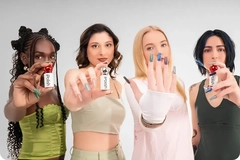Beiersdorf incorporates 50% recycled aluminum in lightweight deodorant cans to half CO2e emissions

15 Sep 2023 --- Beiersdorf has announced that starting this and next year, all deodorant cans in the European assortment of Nivea, 8X4, Hidrofugal, and Hansaplast will contain at least 50% recycled aluminum and will weigh 11.6% less due to material reduction.
The switch will reduce CO2e emissions in the aerosol can value chain by around 58%. This corresponds to a reduction of approximately 30 metric tons of CO2e emissions annually.
“Aluminum is eternally recyclable without any loss of properties. It can be turned into new aluminum packaging endlessly without compromising safety, color or strength. This is very [environmentally] sustainable, as it establishes a true circularity or closed loop for this material, without using any new resources,” Alban Bourcier, packaging expert at Beiersdorf, tells Personal Care Insights.
The recycled material used is sourced from the European market. It is remelted and processed into aerosol cans, which Beiersdorf then uses for its products, such as deodorants, at its new plant in Leipzig-Seehausen, Germany.
Infinitely recyclable cans
Aluminum can be recycled an infinite number of times without losing its high-quality properties as a packaging material. Beiersdorf says the material is light, stable, easy to shape and provides ideal protection for its deodorant. In addition, the recycling approach “creates new perspectives for the circular economy and significantly reduces energy consumption compared to primary aluminum production.”
 The new Nivea deodorant cans are made from recycled material sourced from the European market.Bourcier says that Beiersdorf doesn’t view packaging as linear anymore, where it is produced once and disposed of by the consumer. “We are focusing on circular approaches and work on implementing the design-for-recycling approach.”
The new Nivea deodorant cans are made from recycled material sourced from the European market.Bourcier says that Beiersdorf doesn’t view packaging as linear anymore, where it is produced once and disposed of by the consumer. “We are focusing on circular approaches and work on implementing the design-for-recycling approach.”
“We are extending this more [environmentally] sustainable packaging solution to the entire deodorant aerosol assortment. This brings us closer to reaching our ambitious climate target that we have set with our Care Beyond Skin Sustainability Agenda: The absolute reduction of our CO2e emissions across Scope 1, 2 and 3 by 30% by 2025,” explains Bourcier.
Bourcier continues that technical changes in the packaging do not change the product’s functionality. “For our consumers, the product-use experience is fully identical,” he says.
CO2e reduction
Referring to the number of emissions used to manufacture the aluminum for the new cans, Isabell Niggemann, global procurement manager sustainability manager, tells us that it is hard to give an exact figure on CO2e emissions, as they largely depend on the energy sources used in the smelting process of primary aluminum.
“If renewable energy is used, much lower emissions are caused, approximately 40% less. A higher CO2e emission reduction can be achieved if existing aluminum is recycled. With this, we can lower the emissions significantly more.”
Weight reduction and sourcing primary material from “green production” are further levers for reducing the CO2e footprint. Beiersdorf and its packaging suppliers are now exploiting these opportunities in Europe. Beiersdorf plans on implementing recycled aluminum cans for its other products.
Beiersdorf plans on implementing recycled aluminum cans for its other products.
Lighter cans for cosmetics
The plant in Leipzig-Seehausen, where the production of cosmetic products for the European market is currently ramped up, is making a key contribution to implementing the Group’s “Climate Care” strategy with its production technology.
“Our new, state-of-the-art production center in Leipzig has the technology to process lighter cans,” says Stephan Roelen, plant manager of Beiersdorf Manufacturing Leipzig. “The facility meets the highest environmental standards and was built with a modular, flexible design to adapt to new technologies, consumer demands and market developments.”
Due to the use of renewable energies and biogas for heat generation, the plant operates on a virtually CO2e-neutral basis. There are plans to expand the plant into an “Energy+” site. In this case, more energy would be generated than consumed through the plant’s renewable energy generation.
In the future, Leipzig will produce Nivea brand deodorants, hair sprays and shaving foams, alongside the aerosol products of 8X4, Hidrofugal, and Hansaplast for the European market.
The production center can recover and recycle valuable resources such as heat, wastewater and ethanol to a “high degree.” It also offers new possibilities for filling lightweight aerosol cans to handle this lighter packaging made of recycled aluminum in the production process – vacuum depalletizers have been installed. They transport the lightweight empty cans in layers and particularly gently from the pallets to the production line without damaging them.
By Sabine Waldeck













